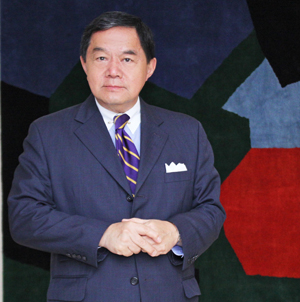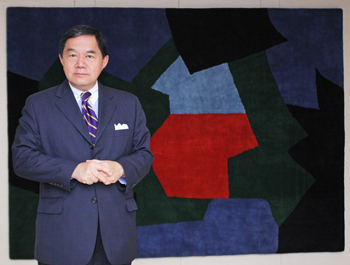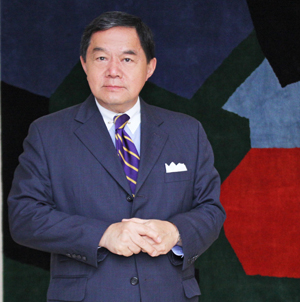2019年04月號 領航者的話
Hope “Han Fever” Will Bring Success for Taiwan —Thoughts of an Entrepreneur Who Doesn’t Understand Politics
Far Eastern Group / Chairman Douglas Hsu


Since the newly elected city mayors resumed their posts end of last year, the Far Eastern Group (FEG) has received many phone calls from these officials wishing to understand our needs, and anticipate our investments in their cities. These mayors did not relax even during the busiest pre-Chinese Lunar New Year period, but continued to visit us. This is a new phenomenon! We used to ask for an audience to exclude investment barriers. Now they earnestly express their willingness to help the industry and people to solve our problems. There’s a big difference between these two approaches. In the people-oriented era of democracy, we begin to feel we are important!
The priorities for Mayor Han Kuo-Yu are to boost tourism and revive the economy. From street vendors to blue-collar workers, we are starting to see momentum in Kaohsiung, people reuniting and citizens looking forward to the future. This is what a leader should do. A proper city economic plan can also help elevate its competitiveness. For example, in Singapore all food vendors are gathered in one place where the food is clean, delicious, and sanitary. Each time I travel to Singapore, I will visit there to enjoy the local delicacies.
I do not personally know Mayor Han. The above comment is merely my observation. However, with reference to the “Han Fever”, I have a couple of thoughts:
The massive press coverage that is continuously broadcasting on Mayor Han, such as handing out red envelopes extensively during the Chinese New Year season is actually detrimental, though you might think it shows support. Political figures should avoid overexposure. Hillary Clinton was a victim of it in the 2016 U. S. presidential election. Electors were too familiar with her position, her appearance, her presentation, and they did not find her remarkable. If Mayor Han could subside a bit and recharge, a man of his stature will have the opportunity to achieve greater good in the future.
Secondly, Mayor Han only started his post as Kaohsiung Mayor less than two months ago, and there are already many callings for him to run for the 2020 R. O. C. Presidency. However, this seems too sudden. Therefore, I boldly suggest to Mayor Han to perhaps announce that he will not run for president to cease all the speculations. He should take this four-year term as a training period to strengthen his skills and improve the competitive edge of Kaohsiung.
Local government officials are like the CEOs (Chief Executive Officer) of a company, and should therefore make the best of their bestowed executive power. Perhaps some would think that execution details are too trivial for leaders to worry over, but only through understanding these details can one see the whole picture more clearly. Kaohsiung City requires major transformation to embrace the new economy; ability to execute is the key to these transformations.
We would suggest Mayor Han to strengthen overall city planning during his four-year term, bring out the Mini-Macro Economic Development blueprint of Kaohsiung’s future development for the citizens to see as a model for other cities’ developments. Kaohsiung is a compound city with profound culture and a foundation comprising of shipping, business, finance, and small but unique shops all over the streets. Yet, during the past 20 some years its development has been very restricted. Kaohsiung Port is a world renowned deep-water port and was ranked among the top three globally, but now has dropped to the 15th place. Comparing today with the past, it is such a shame. Meanwhile, Shanghai, Shenzhen, and Port of Ningbo-Zhoushan have over-crowded ports, and are forced to utilize the Port of Xiamen. But Xiamen is in an unideal geographic location and has limitation in transport volume. Kaohsiung Port is the best replacement. If cargos from China can be shipped there, it will definitely bring tremendous business opportunities.
Another case is the closure of Kaohsiung Naphtha Cracker Section V causing high levels of unemployment. Twenty-two down-stream petrochemical plants were forced to move out due to an unsteady supply of raw materials. Kaohsiung’s petrochemical industry accounts for one fourth of Kaohsiung’s GDP. Taiwan’s overall petrochemical industry accounts for 27% of Taiwan’s industrial output value. In recent years, the world’s anti-pollution equipment has been greatly renovated. Operators in the petrochemical industry are also well aware of the advancing needs for environment-protection against pollution. For example, the plant of our Oriental Union Chemical Corporation has achieved nearly zero-carbon emission levels and full waste water recycling. Many advanced petrochemical plants have already set up solid foundations in Taiwan, and should not abruptly abandon them.
For Mayor Han to fulfill his ambition, he must gain support from the government. At this time, he needs friends rather than enemies. He should avoid provoking confrontation or dispute. For example, in his previous question to President Tsai Ing-wen he asked, “You do not agree with the 1992 Consensus, nor do you dare announce ‘Taiwan Independence,’ then what do you want? Where are you leading the 23 million people of Taiwan?” Indeed this is what many people would like to ask, but if the expression could be more amicably spoken, perhaps more space for dialogue could be created. Only with de-political, mutual respect, and friendliness, we could bring a better future for Taiwan.
In addition, facing Mayor Han with such high popularity, each political party should take on the attitude of “correct mistakes if any and maintain a good record if you have none,” as Mayor Han has become the voice of the people. The ruling party has placed the best artistic construction and infrastructures in Kaohsiung in the past, but people wanted change and the voters decided with their votes. This is the essence of democracy. The ruling party should think about why Mayor Han is welcomed by the people and reflect upon how to improve themselves so as to enhance the welfare for the whole nation.
Kuomintang (KMT) should also look favorably at the “Han Fever.” Mayor Han stood out as a non-orthodox party member, totally representing voters’ expectation for KMT to change and create an energetic, bright, and optimistic new image. Actually, this is also the current joint aspiration for Taiwan’s society. Everyone is abandoning ideology, and committed to boosting economy. KMT’s think tank encompasses a great deal of scholars and former ministers who have rich academic and administrative experiences. They should be able to assist Mayor Han Kuo-yu to plan and execute municipal administration, consolidate theoretical foundations, gain voters’ trust, and enhance citizen solidarity. Whether running for president or not, once Mayor Han clearly makes his decision, everyone will wholeheartedly support Kaohsiung and build up Taiwan.
I humbly propose four suggestions for Kaohsiung’s city developments: 1. Learn from advanced nations such as Singapore and open up foreign capital to buy real estates, and set up complementary measures to prevent flipping properties. 2. Strengthen international medical collaboration. 3. Launch a thorough, long-term tourism plan. 4. Increase efforts to attract foreign students and compensate for the lack of students. Let Kaohsiung become more open and more international. Anyway, as long as Mayor Han commits to “Zero Politics, Hundred Percent Economy” and engages whole-heartedly in development and construction, all will take a positive attitude and wish him luck. This is what Taiwan needs, and blessing for the people!
Now both ruling and opposition parties, central and local governments should all collaborate to elevate Taiwan’s economy. According to many research reports, 2019 will be a turbulent year for the world with the elevated U. S.–China trade war heightening financial pressure in the emerging markets. The World Bank published its January 2019《Global Economic Prospects》 titled “Darkening Skies.” Global economic growth in 2019 is expected to slow from 3% to 2.9%. Asian Development Bank also lowered their expectation of Taiwan’s gross domestic product growth to 2.6%. In the past decade, Taiwan’s economic growth ranked last of the Asian Four Dragons, including this year. How can we not be more alert? Internal fighting does us no good. Advancing democracy! Taiwan, Go! Go! Go!
(Written by Mr. Douglas Hsu, Chairman & CEO of the Far Eastern Group)#



















